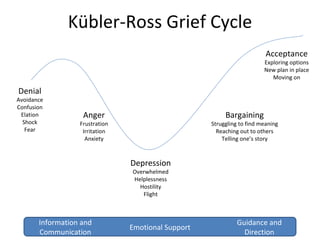Kubler Ross Grief Cycle
•Descargar como PPT, PDF•
5 recomendaciones•19,262 vistas
This model is very helpful for understanding and managing the emotions of change
Denunciar
Compartir
Denunciar
Compartir

Recomendados
Recomendados
Más contenido relacionado
La actualidad más candente
La actualidad más candente (20)
Obsessive-Compulsive and Related Disorders (DSM-V)

Obsessive-Compulsive and Related Disorders (DSM-V)
Emotional intelligence and Emotional Resilience in Social Work

Emotional intelligence and Emotional Resilience in Social Work
Psychological and Psychospiritual Aspect of Cancer Management

Psychological and Psychospiritual Aspect of Cancer Management
Kubler Ross Grief Cycle
- 1. Kübler-Ross Grief Cycle Denial Avoidance Confusion Elation Shock Fear Anger Frustration Irritation Anxiety Depression Overwhelmed Helplessness Hostility Flight Bargaining Struggling to find meaning Reaching out to others Telling one’s story Acceptance Exploring options New plan in place Moving on Information and Communication Guidance and Direction Emotional Support
Notas del editor
- “ Elisabeth Kübler-Ross (July 8, 1926 to August 24,2004) a Swiss-born psychiatrist, a pioneer in Near-death studies and the author of the groundbreaking book On Death and Dying (1969), where she first discussed what is now known as the Kübler-Ross model. In this work she proposed the now famous Five Stages of Grief as a pattern of adjustment. These five stages of grief are denial, anger, bargaining, depression, and acceptance. In general, individuals experience most of these stages, though in no defined sequence, after being faced with the reality of their impending death. The five stages have since been adopted by many as applying to the survivors of a loved one’s death, as well.” http://www.ekrfoundation.org/